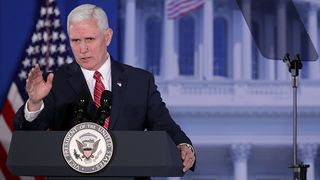Vice President Mike Pence will touch down in Sydney this week aboard Air Force Two – his two-day visit to Australia likely to be low-key affair.
It will be the first time a sitting US vice president has come to Australia before a president in nearly 30 years. Pence’s recent predecessors, Dick Cheney and Joe Biden, did not make the trip down under until the tail end of the Bush and Obama administrations respectively. Unlike Joe Biden last year, Pence will not make a big speech while he’s in town.
Rather, Pence will be in listening mode, getting to know Australia’s political and business leaders and seeking to reassure Australians in the wake of the Trump-Turnbull phone call.
Pence’s visit is important because he has been a valuable interlocutor for Australia in the Trump administration: Foreign Minister Julie Bishop has had several phone calls with the vice president and met him in Washington in February. Some of Pence’s cabinet colleagues – Secretary of State Rex Tillerson and Secretary of Defense James Mattis – have visited North Asia but have not ventured further south. But Pence decided to come to Australia within the first 100 days of his term, at the end of a 10-day tour that also includes Republic of Korea, Japan and Indonesia.
Pence will meet the prime minister, foreign minister and opposition leader, hold an event with business leaders and do some sightseeing with his wife Karen and two daughters. The father of a US Marine, Pence will no doubt talk about Australia’s shared military service with the United States and may meet the 1,250 marines who this week arrived for their rotation in Darwin. He will reportedly confirm the US-Australia refugee deal and will focus on US economic engagement in Asia, with his every word followed closely after the collapse of the TPP.
Pence is a pro-trade, pro-alliance Republican who is natural friend of Australia. So it should be a successful visit that bolsters Australia’s relationship with a key player in Washington, and therefore enhances our capacity to influence the Trump administration’s approach to Asia. Just don't expect major policy pronouncements.




